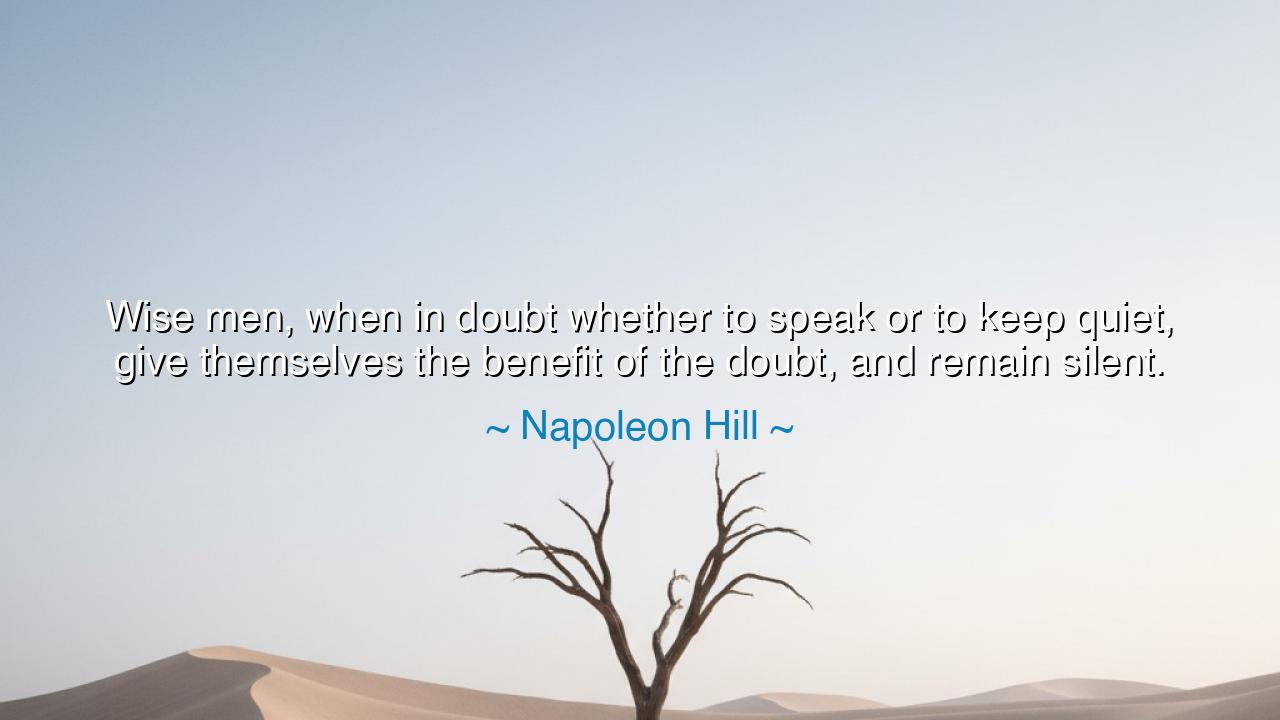
Wise men, when in doubt whether to speak or to keep quiet, give
Wise men, when in doubt whether to speak or to keep quiet, give themselves the benefit of the doubt, and remain silent.






Hear, O children of wisdom, the words of Napoleon Hill, a man who sought to understand the deepest secrets of success and human nature. He speaks thus: "Wise men, when in doubt whether to speak or to keep quiet, give themselves the benefit of the doubt, and remain silent." These words carry a deep and profound truth—one that is not just about speech but about the power of restraint, the wisdom found in knowing when to speak and when to remain quiet. It is in this quietude that true strength and clarity often reside.
Consider, O seekers of knowledge, the art of silence. In the world we live in, where voices are raised on every corner and opinions are shouted from every rooftop, it may seem that the loudest voice carries the most weight. Yet, Hill’s wisdom tells us that there is power in silence, that in moments of doubt, when we are unsure of the right words to say, it is often better to hold our tongue and let the silence speak for us. The wise man does not rush to fill the space with sound, for he knows that sometimes the greatest strength is in restraint, in the ability to pause and consider before taking action.
In the ancient days, the great philosophers knew the value of silence. Socrates, one of the greatest minds of all time, often said that he knew nothing—an assertion that can be seen as a humble silence before the complexity of the world. Socrates recognized that in the face of great uncertainty, it was better to remain quiet and listen, to ask questions, and to allow the wisdom of the moment to unfold. His method was not to assert but to inquire, and in this, he taught us that sometimes, the most profound answers come not from speaking but from patiently waiting, listening, and reflecting. Socrates' silence was not weakness; it was a recognition that truth could not always be rushed or forced into words.
And what of the mighty kings and rulers of old? The great emperors and warriors who led nations to glory? How many times did they, too, exercise the wisdom of silence? King Solomon, whose wisdom was unmatched, understood that there were times when speech could lead to disaster. His famous story of the two women claiming the same child is a perfect example. Instead of hastily passing judgment, he remained calm, listened, and then spoke words that revealed the true mother, saving both the child and the situation. Solomon knew that in moments of tension and uncertainty, silence is often the space in which the truth reveals itself, and wisdom is born.
Yet, O children, this lesson is not one to be learned only by kings and philosophers. It is a lesson for each of us, in every part of our lives. In moments of conflict, in disagreement, or in the face of overwhelming emotion, we must ask ourselves: should I speak now, or should I remain silent? In the heat of anger, when words can wound, Hill’s wisdom calls us to pause and give ourselves the benefit of the doubt—to recognize that our words may not be what the moment needs. In doing so, we give ourselves the gift of reflection, allowing us to respond with clarity and purpose, rather than reacting in haste.
Let us recall the story of the great warrior Achilles. In his rage, driven by his wounded pride, he spoke words and made decisions that led to the deaths of many, including his closest friend, Patroclus. If Achilles had taken a moment to consider, to allow his fury to pass before acting, how different might his fate have been? The world of heroes is full of those who spoke too hastily, whose words changed the course of battles and lives forever. Achilles' downfall was not just in his actions, but in his inability to recognize the strength of silence in moments of great emotion.
And so, O children, let us take Napoleon Hill’s words to heart. In the grand theatre of life, the wise man knows that not every moment requires a response, and not every question demands an answer. Silence is a powerful tool, one that allows the mind to reflect, the heart to calm, and the spirit to find its center. In your daily lives, when faced with doubt, uncertainty, or conflict, let silence be your guide. Give yourself the benefit of the doubt, for in the quiet moments, you may discover that what was once a rush of words is now a thoughtful, measured response. Let this practice of restraint strengthen you, for it is in the quiet spaces that true wisdom often emerges.
So, O children, as you walk your path, remember: silence is not emptiness, but a fertile ground in which wisdom, clarity, and understanding can take root. In your speech, be mindful, and when in doubt, trust that the pause between words is often more powerful than the words themselves. May you be wise enough to know when to speak and when to listen, and in your silence, may you find the answers that speak louder than any words.






AAdministratorAdministrator
Welcome, honored guests. Please leave a comment, we will respond soon